
Friday, September 29, 2006
TRJ: Cuckoo for Cuckold Puffs
Today's special in the history of WordHumper because we're inaugurating "Total Request Jive" or "TRJ" for short. This will be a weekly Friday feature where you the WordHumper reader decide which lucky word gets humped back to the stoneage (or at least to Proto-Indo-Europa). And today's word comes to us from CH in Brooklyn who IMs:
CH: i want you to hump "cuckold"
CH: i bet it's dirty
 I accept your challenge, CH! Cuckold goes back to the Old French word for the cuckoo bird. Because it's Friday and I'm lazy and the research has already been done let's go right to the blockquote from American Heritage.
I accept your challenge, CH! Cuckold goes back to the Old French word for the cuckoo bird. Because it's Friday and I'm lazy and the research has already been done let's go right to the blockquote from American Heritage. The female of some Old World cuckoos lays its eggs in the nests of other birds, leaving them to be cared for by the resident nesters. This parasitic tendency has given the female bird a figurative reputation for unfaithfulness as well. Hence in Old French we find the word cucuault, composed of cocu, “cuckoo, cuckold,” and the pejorative suffix –ald and used to designate a husband whose wife has wandered afield like the female cuckoo. An earlier assumed form of the Old French word was borrowed into Middle English by way of Anglo-Norman. Middle English cokewold, the ancestor of Modern English cuckold, is first recorded in a work written around 1250.The OED adds that in German cuckold
...applied to the adulterer as well as the husband of the adulteress, and Littré cites an assertion of the same double use in French; in English, where cuckold has never been the name of the bird, we do not find it applied to the adulterer.You may have heard that cuckolds are sometimes "wearing the horns"--if you're into egregious acts of humiliation you'll be happy to learn that this refers to an apocryphal tradition that claims in some European villages when a wife gives birth to a child recognizably not his own a parade is held "...in which the hapless husband is forced to wear antlers on his head as a symbol of his wife’s infidelity". Ouch.
 It should be noted that although cuckold does have a rather negative connotation not all men who suffered this fate were necessarily unhappy. In fact a wittol is a man who doesn't mind that his wife is servicing the neighborhood. This comes from the Middle English wetewold, which is composed of the verb weten (to know), and (coke)wold, which, as we saw above means cuckold. The most famous of wittols is likely Sir William Hamilton (left) whose wife Emma became the lover of Horatio Nelson.
It should be noted that although cuckold does have a rather negative connotation not all men who suffered this fate were necessarily unhappy. In fact a wittol is a man who doesn't mind that his wife is servicing the neighborhood. This comes from the Middle English wetewold, which is composed of the verb weten (to know), and (coke)wold, which, as we saw above means cuckold. The most famous of wittols is likely Sir William Hamilton (left) whose wife Emma became the lover of Horatio Nelson.On a side note, the Middle English weten is also responsible for our Modern English word wit. And in case you're wondering how cuckoo came to mean a foolish or crazy person, I'm sorry to say sources are vague at best. The OED simply notes that a person is called cuckoo in reference to the "bird's monotonous call."
wittol [American Heritage]
wit [American Heritage]
wittol [OED]
cuckold [OED]
cuckoo [OED]
cuckold [Wikipedia]
cuckoo [Wikipedia]
William Hamilton [Wikipedia]
Labels: Anglo-Norman, Middle English, Old French, TRJ
Thursday, September 28, 2006
The Daily Hump: Rigmarole
Rigmarole, a common enough word meaning a confused, rambling, petty discourse or a succession of lame tasks, is apparently an alteration of Ragman Roll. Ah, yes, the famous Ragman Roll...wait, what the hell is a Ragman Roll? It's time for some hot and heavy blockquote action beginning with our friends at Wikipedia:
And per the OED the Ragman Roll appointed "justices [of King Edward I] to hear and determine complaints of injuries done within 25 years previous" (a list of complaints could certainly be considered a rigmarole in our modern sense of the word). The American Heritage and Merriam Webster dictionaries say that Ragman Roll is from the Middle English Ragmane Rolle, which was a scroll used in Ragman, a game of chance. Per the OED Ragman wasRagman Rolls the name given to the collection of instruments by which the nobility and gentry of Scotland were compelled to subscribe allegiance to King Edward I of England between the Conference of Norham in May 1291 and the final award in favor of Baliol in November 1292 and again in 1296.
a. A game of chance, app. played with a written roll having strings attached to the various items contained in it, one of which the player selected or ‘drew’ at random. In one form the game was a mere amusement, the items in the roll being verses descriptive of personal character.Who was King Ragman? It's possible he was a King Ragemon le Bon, no relation to Simon, who had a number of verses written about him around the year 1290. Michael Quinion over at World Wide Words points out that some believe the name of the game Ragman came "from rag in the sense of tatters, used as a name for a devil (as in ragamuffin, originally a demon)." The Ragemon le Bon theory seems much more likely given that it can't be mere coincidence that King Eddie I issued his so-called Ragman Roll at the Conference of Norham just one year after the Ragemon verses were written.
b. King Ragman, feigned to be the author of the roll used in playing the game.
In conclusion, here's the timeline as I see it:
Circa 1290: Versus are written about King Ragemon le Bon, which spawns a game, Ragman
May 1291: Conference of Norham - King Edward I issues his Ragman Roll, so named because for whatever reason it reminded people of the game Ragman
Sometime later: Ragman Roll comes to mean a rambling discourse
Mid 18th c: Per the OED, the word rig-my-role starts appearing meaning a rambling discourse
Late 18th c: Rigmarole appears with modern spelling
*Pure poppycock, actually--monkey kung fu *always* distracts us.
Labels: Middle English, Middle French, The Daily Hump
Tuesday, September 26, 2006
The Daily Hump: Charlatans
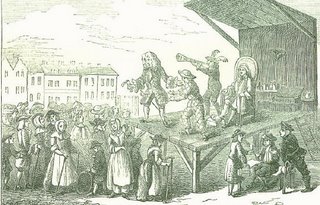 Charlatans are frauds who often make elaborate claims of skill or knowledge in order to con their unassuming victims. The word has numerous synonyms and today we're going to examine a few.
Charlatans are frauds who often make elaborate claims of skill or knowledge in order to con their unassuming victims. The word has numerous synonyms and today we're going to examine a few. First, let's look at the word charlatan itself. It's a word that came to English in the early 17th century via the French, who borrowed it from the Italian ciarlatano, which is a hybrid of ciarlare, "to prattle" and cerrentano, an inhabitiant of Cerreto. According to the American Heritage Dictionary Cerreto was a city once famous for its quacks.*
 And speaking of quacks, in the above definition it's actually an abbreviation for quacksalver. Not to be confused with quicksilver (which is a future hump), quacksalver comes to us from 16th century Dutch where it was thought to mean "one who quacks about ointments." It has also been suggested that the quack- portion meant "to work in a bungling fashion", but that doesn't lend itself to as much humormous imagery.
And speaking of quacks, in the above definition it's actually an abbreviation for quacksalver. Not to be confused with quicksilver (which is a future hump), quacksalver comes to us from 16th century Dutch where it was thought to mean "one who quacks about ointments." It has also been suggested that the quack- portion meant "to work in a bungling fashion", but that doesn't lend itself to as much humormous imagery.Our final synonym is mountebank, a word of Italian origin that literally translates to "mount on a bench" and refers to the raised platforms used by the hawkers (see sketch at top). It's also synonymous with saltimbanco, which means "to leap on to a bench."
I leave you today with a dialogue from SNL:
Alex Trebek: ...And finally, Sean Connery's also here let's move on to Double Jeopardy where the categories -*I googled "Cerreto" trying to find out more about its quack addiction. None of the tourist sites mention anything about charlatans; it's just your usual prattle about beautiful Tuscan-like villas and medieval churches. When you google "Cerreto quacks" all you get are hundreds of websites quoting the exact same etymology for charlatan that I used above. Thankfully, after googling "cerreto history charlatans" the Historical Archives of Italian Nephrology pulled through via the US National Center for Biotechnology Information:
Sean Connery: Not so fast Trebek.
Alex Trebek: I really thought that was going to work.
Sean Connery: Well, you were wrong, you mountebank. I pose a conundrum to ya, I riddle if you will
Alex Trebek: I don't want to hear it.
Sean Connery: What's the difference between you and a mallard with a cold? One's a sick duck and I can't remember how it ends, but your mother's a whore. [Laughs]
Cerreto is a tiny town in the Valnerine area (Umbria) famous all over the world for the phenomenon of charlatanism derived from Cerretani inhabitants. In the Middle Ages, these people started to beg for alms on hehalf of medical and religious foundations. When their occupation ended due to religious prohibition (Council of Trent) the Cerretani shifted to Charlatanism or quackery. The Charlatans exploited the absence of institutional medicine in rural areas and the credulity and superstition of many sick people. A cynical distrust of the medical profession in urban areas helped the charlatans' activity to spread. They delivered diagnostic advice and therapeutic remedies in public squares. Renal and bladder remedies were key cures from still earlier quackeries. Some historians of medicine believe that some rural or town citizens were particulalry addicted to panaceas or placebos. Charlatans from all over the world poured into the happy hunting grounds. Quackery flourished on a grand scale until education spread throughout the population and medical services were made available to the poor. Special laws to safeguard health-care, helped undermine the charlatan healing phenomenon. Popular quackery medicine neared its end in the mid twentieth century.quacksalver [OED]
montebank [OED]
saltimbanco [OED]
Labels: Dutch, French, Italian, The Daily Hump
The Daily Hump: The Welsh and Their Nuts
 Yes, today we're humping the Welsh. I know, England has been humping the Welsh since Eddie I defeated Llywelyn ap Gruffudd in 1282. And, unfortunately, we're not humping Catherine Zeta Jones, nor even Anthony Hopkins; just the Welsh en masse. Let's get the ball rolling with some good ol' fashioned jokes directed at everyone's second favorite group of Celts.
Yes, today we're humping the Welsh. I know, England has been humping the Welsh since Eddie I defeated Llywelyn ap Gruffudd in 1282. And, unfortunately, we're not humping Catherine Zeta Jones, nor even Anthony Hopkins; just the Welsh en masse. Let's get the ball rolling with some good ol' fashioned jokes directed at everyone's second favorite group of Celts.Q: What do you call a sheep tied to a fence in Wales?
A: A leisure center.
Q. What do you call a Welshman with many girlfriends?
A. A Shepherd.
Q. Did you hear that Welsh people have discovered a new use for sheep?
A. Wool.
Per the Wikipedia (I'm feeling lazy today):
The English name for Wales originates from the Germanic word Walha, meaning "stranger" or "foreigner", probably derived from the name Volcae (a powerful 2nd century BC nation of Gaul). As the Celts of Gaul were Romanized, the word changed its meaning to "Romanic people", as is still apparent in the name of the Walloons of Belgium, Wallachia in Romania, as well as the "-wall" of Cornwall. The Welsh themselves called themselves Cymry, "compatriots", and named their country Cymru, which is thought to have meant "Land of the Compatriots" in Old Welsh; this has reference to their awareness that they were the original countrymen of Wales, and indeed Britain by virtue of their ancestors the Brythoniaid (Brythons), and also in order to distinguish themselves from the foreign invaders of Britain, the Saeson (English)...
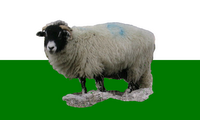 The Welsh are nuts. Well, actually, they're walnuts. Okay, that's not really true either, but walnut comes from the Old English word wealhhnutu. The first element, wealh, is the Old English equivalent to the Germanic word Walha, which, as you read above is responsible for our English word Wales and meant "foreign" (no surprise, but the second element, hnutu, is "nut"). Both wealh and Walha have the same Old Teutonic root, *wal{chi}o-z. These foreign nuts (that is, walnuts, not the Welsh) were called wealh because they were from the Roman lands of Italy and Gaul and needed to be distinguished from the native hazelnut.
The Welsh are nuts. Well, actually, they're walnuts. Okay, that's not really true either, but walnut comes from the Old English word wealhhnutu. The first element, wealh, is the Old English equivalent to the Germanic word Walha, which, as you read above is responsible for our English word Wales and meant "foreign" (no surprise, but the second element, hnutu, is "nut"). Both wealh and Walha have the same Old Teutonic root, *wal{chi}o-z. These foreign nuts (that is, walnuts, not the Welsh) were called wealh because they were from the Roman lands of Italy and Gaul and needed to be distinguished from the native hazelnut. Before we conclude, I should mention there's a verb welsh, meaning to swindle a person by not paying a debt or wager. Or, in a more general sense, to welsh someone is to not fulfill an obligation. The origin of this sense is unknown.
*Requisite disclosure: I spent about 6 weeks working near Eglwyswrw during the summer of '98 and had a great time.
UPDATE: Welshnut is Dorset slang for walnut. [Probert]
Jokes about the Welsh [Celtic.info]
Wales [Wikipedia]
walnut [OED]
welsh [American Heritage Dictionary]
Labels: Old English, Proto-Germanic, The Daily Hump, Welsh Gaelic
Monday, September 25, 2006
The Daily Hump: What's next, Gormagons?
First, let's begin with the Gormagon, which was recently featured as Michael Quinion's "Weird Word". A Gormagon can be one of two things; it's
A monster with six eyes, three mouths, four arms, eight legs, five on one side and three on the other, three arses, two tarses [penises], and a cunt upon its backFunny enough, a Gormagon can also refer to a member of an 18th century society that imitated the Freemasons. The etymology is pretty much unknown with the OED claiming it's a nonsenical word that has "pseudo-Chinese" roots ("1725 Two Letters in Grand Mystery of Freemasons (ed. 2) 13 The Venerable Order of Gormogons having been brought into England by a Chinese Mandarin.")
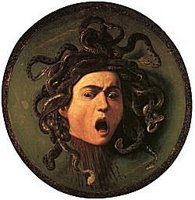 I wonder whether the word is related to Gorgon, the three snake-haired sisters of which Medusa is the most well-known. Gorgon is from a Greek word meaning "terrible" and the Gormagon certainly seems terrible. In case you're wondering Gorgonzola cheese is named after a village near Milan and has no connection to Gorgons from what I can tell; however, I might be wrong.
I wonder whether the word is related to Gorgon, the three snake-haired sisters of which Medusa is the most well-known. Gorgon is from a Greek word meaning "terrible" and the Gormagon certainly seems terrible. In case you're wondering Gorgonzola cheese is named after a village near Milan and has no connection to Gorgons from what I can tell; however, I might be wrong.Next up, next. If we trace the history of the English language back through time we eventually hit a point where it does not exist as a distinguishable language of its own. We know Middle English came before Modern English and Old English came even earlier, but what language gave birth to Old English? The answer is Old Frisian, a language spoken on the European North Sea coast from the 8th to 16th centuries. The people who settled in England from the 4th century onward came from these shores and brought with them their vocabulary, including the word next.
Next started off as the superlative form of nigh or near. Around the late 14th century, the word nighest came in to existence, followed by nearest in the 15th century. Around the same time that next fell out of fashion in the superlative sense the OED notes "The notion of greatest proximity tends to be merged into that of adjacency, either within a sequence or series or simply as regards physical location." Henceforth, next began its next life meaning "immediately following."
Gormagon [OED]
Gorgon [OED]
next [OED]
Old Frisian [Wikipedia]
Labels: Chinese, Greek, Middle English, Old English, Old Frisian, The Daily Hump
Friday, September 22, 2006
The Daily Hump: Mötley
 Okay, okay...there really isn't an umlaut in the word motley, it's purely a heavy metal gimmick meant to give a band's logo a Teutonic quality. As Spinal Tap's David St. Hubbins noted "It's like a pair of eyes. You're looking at the umlaut, and it's looking at you."
Okay, okay...there really isn't an umlaut in the word motley, it's purely a heavy metal gimmick meant to give a band's logo a Teutonic quality. As Spinal Tap's David St. Hubbins noted "It's like a pair of eyes. You're looking at the umlaut, and it's looking at you."Now that we have that out of the way, have you really ever given thought to the word motley...motley...you know, really hump the word mentally until you realize it's rather strange? It means "heterogenous" or "having a great amount of variation." In the late 14th century there was an Anglo-Norman word motlei meaning "variegated" or, in the noun form, "variegated cloth" (and was also the name of the outfit worn by a harlequin, hence motley fool). If we attempt to look further back in time the list of potential candidates for motley roots is rather...er...motley. The OED suggests three: medley, motey and mote. Let's take a gander at each.
In regards to medley the OED is specifically referring to a rare definition where it means a type of cloth made of dyed wool, which was frequently multi-colored, hence the name. This sense, in turn, is related to an obscure word, mellay, meaning hand-to-hand combat which is closely related to our very common word melee, meaning a confused violent free-for-all. Melee comes the part participle of the Old French mesler, meaning "to mix." We've seen this root before...here.
Motey is an obscure word that refers to a type of earth used as a pigment which apparently created a speckled appearance when applied. We see references to it from the mid 14th century up through the early 16th century. It's believed, but not confirmed, that the word is related to our third candidate mote.
If you're thinking of a large water-filled ditch surrounding a castle, then you're thinking of a moat, not a mote. A mote is a speck or particle, like the kind you see floating in a beam of light or that annoying speck that gets in your eye or throat, and is a cognate of the West Frisian mot meaning "peat dust." Interestingly, it's possible that mote is related to the Swedish word for dirt, which gave us our word smut. As well, it's possible mote is related to the Germanic base of what became our word moth, those pesky insects that reduce cloth to small fragments.
Ultimately, as with many words, we'll never have a definitive root for motley, just a theory; yet, it's amusing that Mötley Crüe chose a name whose roots are most likely buried in harlequin outfits, fighting and dirt.
On second thought, it's perfect.
motley [OED]
motey [OED]
mote [OED]
Labels: Anglo-Norman, Old French, Proto-Germanic, The Daily Hump, West Frisian
Thursday, September 21, 2006
The Daily Hump: All Goat Things...

If you're like me, and you probably are a bit since you're on this site, you get enjoyment out of humping even the most mundane of words. In fact, you probably find that the more mundane the more interesting the etymology. Today we're going to hump goats...not literally...just linguistically. Goats have been domesticated for upwards of 10,000 years and, as one would expect, the word goat can therefore be traced very far back in time. Our Modern English word comes from the Old English gat (hence the ancient pairing of Old E and gats...), which meant "she-goat". The word then goes back further to Proto-Germanic and finally to Proto-Indo-European *ghaidos meaning "kid" (in the young goat sense) or "play". Thus, we can rename the wholesome hip-hop comedy duo of the House Party movies Ghaidos.
It's strange but everyone seems to have a goat that can be gotten, and not just by the standard means of goat rustling. Just yesterday I used the phrase "[My boss] really gets my goat." The idiom's origin is unfortunately difficult to discern. Take Our Word For It reported waaaaay back in May 2000
The earliest example of the phrase comes from a letter written by Jack London in 1910. It has been suggested that to get one's goat, meaning "to annoy or irritate", derives from the supposed practice of putting a goat in a racehorse's stall to calm the horse. A gambler might pay a stable boy to remove the goat, upsetting the horse and, possibly, the results of the horse's race.TOWFI observes that this explanation seems rather "tenuous" and I couldn't agree more. They suggest, along with others, that the etymology may be connected to the word scapegoat.
 In general terms a scapegoat is the fall guy, the one who bears the blame for others. The word is of Biblical origin. On Yom Kippur the high priest of the Jerusalem temple would confess the sins of the Jews to a goat which was then led out into the wilderness, thus symbolically the sins were cast away (see Leviticus 16:22). Of course, the story doesn't end here. As TOWFI notes*
In general terms a scapegoat is the fall guy, the one who bears the blame for others. The word is of Biblical origin. On Yom Kippur the high priest of the Jerusalem temple would confess the sins of the Jews to a goat which was then led out into the wilderness, thus symbolically the sins were cast away (see Leviticus 16:22). Of course, the story doesn't end here. As TOWFI notes* William Tyndale, translator of the Bible in the 16th century, is credited with coining the English term, having translated it from Hebrew azazel. So what is azazel? It is a word which only appears in Leviticus 16:10, with reference to a Hebrew practice for Yom Kippur. Two goats were brought forth, and one was sacrificed to God, while the other was "given" the people's sins and then set free in the wilderness, carrying the sins away. The latter goat was interpreted by Tyndale to be the azazel, meaning "scapegoat", though this is now understood to be incorrect. The Good News Bible, along with most other current translations, renders the passage "There he shall draw lots, using two stones, one marked 'for the Lord' and the other 'for Azazel.' Aaron shall sacrifice the goat chosen by lot for the Lord and offer it as a sin offering. The goat chosen for Azazel shall be presented alive to the Lord and sent off into the desert to Azazel, in order to take away the sins of the people." The meaning of the Hebrew word is not known, though The Good News Bible suggests that it may be the name of a desert demon.In fact, the Talmud and later Jewish commentators maintain Azazel was the name of the precipitous cliff where the goat met its end. In Modern Hebrew, "lekh l'Azazel" is the equivalent of the English curse "go to Hell". And speaking of Hell and desert demons, Satan is, of course, often depicted as goat-like although this is the influence of the Greek demigod Pan, not Azazel.
*Tyndale's exact rendering from 1530: "The goote on which the lotte fell to scape"
scapegoat [OED]
Goat [Wikipedia]
Azazel [Wikipedia]
Labels: Hebrew, PIE, The Daily Hump
Wednesday, September 20, 2006
The Daily Hump: Jinx!
It is generally believed that the word jinx derives from the word jynx (or jyng). Jynx, in addition to being a charm or spell, is an order of spiritual intelligences in Chaldaic philosophy, Chaldea being a Hellinistic designation for part of Babylonia. The Romans used the word Chaldean to describe astrologers and mathematicians from the Babylonian region and they borrowed the word jynx (as iynx) from the Greeks where the word referred to the wryneck, a bird which was used heavily in witchcraft rituals. The wryneck is remarkable for its ability to twist its head almost 180 degrees while hissing like a snake, making it understandable why the Greeks and Romans would associate the bird with malevolent undertakings.
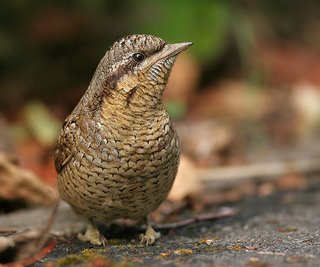
Given that it has referred to a bad luck charm (in some form of spelling) for millennia it's odd that jinx does not have a recorded English usage until 1911. It is especially surprising that the first recorded usage is made in reference to baseball. The Chicago Daily News wrote, "Dave Shean and ‘Peaches’ Graham...have not escaped the jinx that has been following the champions". It's possible that jinx made its American debut about 40 years earlier in the title of the folksong "Captain Jinks of the Horse Marines".
The first day I went out to drilljinx [OED]
The bugle sound made me quite ill,
At the Balance step my hat it fell,
And that wouldn't do for the Army.
The officers they all did shout,
They all cried out, they all did shout,
The officers they all did shout,
"Oh, that's the curse of the Army."
jynx [OED]
jinx [Online Etymology Dictionary]
jinx [Wikipedia]
Chaldea [Wikipedia]
Wryneck [Wikipedia]
Book of Jonah [Wikipedia]
Labels: Greek, Latin, The Daily Hump
Tuesday, September 19, 2006
The Daily Hump: We the people...
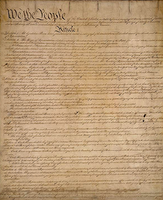 I'm unique--at least I think I'm unique--because I'm one of the few people in the United States that not only knows the Preamble to the US Constitution by heart, but can also sing it. It's all because of a terrible homework assignment in the 4th grade (my least favorite grade) when we had to memorize the Preamble. I have the memory of a mad cow and thus, it was only by putting the Preamble to song that I was able to commit it to the vaults of my mind. Little did I think that 20 years later I'd still be able to recite
I'm unique--at least I think I'm unique--because I'm one of the few people in the United States that not only knows the Preamble to the US Constitution by heart, but can also sing it. It's all because of a terrible homework assignment in the 4th grade (my least favorite grade) when we had to memorize the Preamble. I have the memory of a mad cow and thus, it was only by putting the Preamble to song that I was able to commit it to the vaults of my mind. Little did I think that 20 years later I'd still be able to recite We the People of the United States, in Order to form a more perfect Union, establish Justice, insure domestic Tranquility, provide for the common defense, promote the general Welfare, and secure the Blessings of Liberty to ourselves and our Posterity, do ordain and establish this Constitution for the United States of America.The Romans had a word, præambulus, which was an adjective meaning "going before." The prefix præ obviously means "before" as pre- does in modern English while ambulus comes from the Latin ambulare meaning "to walk" (ambulance, ambulatory, amble, or pram--short for perambulator). It's therefore no shock that the Preamble to the US Constitution comes before the main body of the Constitution itself.
Interestingly enough in a certain sense constitutional and amble are synonymous. Constitutional is a shortened form of constitutional walk which is simply a stroll taken for the sake of one's health--that is, their constitution. The idea of a constitutional walk first originated at the English universities and constitution itself took on the meaning of health or vitality most likely in the 16th century, 100 years before the word had any meaning as a political document. Constitute is from the Latin cōnstituere meaning to set up, establish or ordain. Con- is simply an intensive prefix while statute is from the Latin verb statuere also meaning to establish or decree. Sta- is the root of the Latin stare, "to stand".
Thus, we can take a figurative amble through the Constitution or a literary constitutional across the Preamble.
constitute [Online Etymology Dictionary]
United States Constitution [Cornell Law School]
constitutional [OED]
constitute [OED]
statute [OED]
Labels: Latin, The Daily Hump
Monday, September 18, 2006
The Daily Hump: Corsair
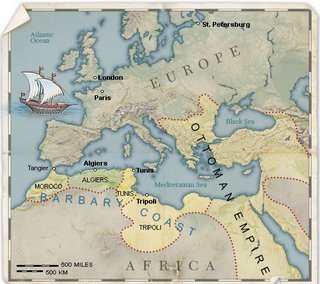 A corsair is simply a pirate, especially a pirate along North Africa's Barbary Coast. The Saracen and Turkish corsairs were actually officially sanctioned by their governments and were used as a means of disrupting Christiandom's Mediterranean trade. Corsair also came to mean the government sanctioned ships that these pirates used.
A corsair is simply a pirate, especially a pirate along North Africa's Barbary Coast. The Saracen and Turkish corsairs were actually officially sanctioned by their governments and were used as a means of disrupting Christiandom's Mediterranean trade. Corsair also came to mean the government sanctioned ships that these pirates used.The corsairs, originally hired by the fledgling US government to protect its merchant ships, began to attack their charges. In retaliation the United States began construction of its navy and launched a series of wars against the Barbary pirates that lasted from 1801 to 1815.
The word corsair came to our language via Old Provençal and Old Italian, having its roots in the Medieval Latin cursārius which is a variation of cursus, meaning "plunder" or "a hostile excursion." In Latin cursus has a much more benign definition simply meaning "a run or voyage" (cursus is the past participle of currere, to run). Hence corsair is related closely to our English word course (as in "to run a course") and as corsairs were often involved in a chase, it's easy to see the etymological connection.
On a side note, the Italians created a false etymology for corsair, associating the word with the Corsicans with whom there was quite a bit of animosity.
corsair [OED]
corsair [Answers.com]
Barbary pirates [Wikipedia]
Labels: Italian, Medieval Latin, Old Italian, Old Provençal, The Daily Hump
Friday, September 15, 2006
The WordHumper Hamper
The Daily Hump: Mating Season
 We all know what a stalemate is. In chess this is a result when the person whose turn it is has no allowable moves and their king is not in check. More figuratively, a stalemate refers to any situation which ends in a draw. Likewise, when a stalemate occurs in chess the game is drawn. Before we delve into the etymology, I think it's interesting to note that a stalemate did not always result in no winner. Per the OED,
We all know what a stalemate is. In chess this is a result when the person whose turn it is has no allowable moves and their king is not in check. More figuratively, a stalemate refers to any situation which ends in a draw. Likewise, when a stalemate occurs in chess the game is drawn. Before we delve into the etymology, I think it's interesting to note that a stalemate did not always result in no winner. Per the OED,In England from the 17th c. to the beginning of the 19th c. the player who received stalemate won the game. Various other rules have been in vogue at different times; sometimes the player giving stalemate won, either wholly or to the extent of half the stake; sometimes the last few moves had to be played over again until a mate resulted; sometimes the piece causing the obstruction was removed.Up until the 18th c. the situation we now call a stalemate was simply known as a stale. For whatever reason the word mate was later appended as a suffix. It's generally believed that the word stale harkens back to the Old French estaler (to come to a standstill). Mate is simply a shortened form of checkmate, and a stalemate could not logically involve a checkmate, thus the word stalemate is a misnomer. On a side note, estaler was adopted into Middle English and spawned our modern verb stall.
Our modern word checkmate comes from the Middle English checkmat which was from the Old French eschec mat which goes back even further to the Arabic šāh māt, literally "the king is dead." The Arabic šāh, meaning "king", was borrowed from the Persian shāh--a title that was used by the monarchs of Iran, most recently by the leader deposed in the 1979 Iranian Revolution.
The plural form of checkmate's Old French ancestor, eschec mat is esches. In Middle English esches was shortened to simply ches, which is where, of course, we find our word for the game itself, chess.
Thus, linguistically speaking, chess is truly the game of kings.
stalemate [OED]
checkmate [OED]
Labels: Arabic, Middle English, Old French, Persian, The Daily Hump
Thursday, September 14, 2006
The Daily Hump: Bob's Your Uncle
At the time I also remember not understanding, even from context, what the idiom meant. I didn't catch on until I came back to the US and started asking some of my British expat friends. Wikitionary defines the idiom rather staccato:
Things are as required, you have what you want, all will be well (appended to the end of a description of how to achieve something).
You want to go to the stadium? Go straight on until you reach the park, take the first left and Bob’s your uncle!
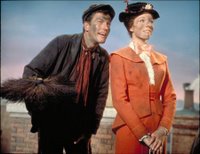 People (at least the ones I know) seem somewhat perplexed when it comes to the idiom's etymology. The theory I heard most often was that the phrase originated in the 1964 film Mary Poppins with a line spoken by Dick Van Dyke's character Bert:
People (at least the ones I know) seem somewhat perplexed when it comes to the idiom's etymology. The theory I heard most often was that the phrase originated in the 1964 film Mary Poppins with a line spoken by Dick Van Dyke's character Bert: When you're with Mary Poppins, suddenly you're in places you've never dreamed of. And quick as you can say "Bob's your uncle," the most unusual things begin to happen.
 Of course, this theory is bunk as there's no character of Uncle Bob in Mary Poppins (just Uncle Albert) so the phrase obviously must have existed before 1964. Per Wikitionary, the idiom goes back to 1887 when Arthur Balfour was appointed Secretary of Ireland by his uncle, the prime minister, Robert (aka Bob), Lord Salisbury.
Of course, this theory is bunk as there's no character of Uncle Bob in Mary Poppins (just Uncle Albert) so the phrase obviously must have existed before 1964. Per Wikitionary, the idiom goes back to 1887 when Arthur Balfour was appointed Secretary of Ireland by his uncle, the prime minister, Robert (aka Bob), Lord Salisbury.But there's a problem with the Wikitionary etymology; the phrase wasn't recorded in the English language until 1937, in Eric Partridge’s Dictionary of Slang and Unconventional English. Patridge claims the idiom has roots going back to 1890 but offers no evidence and none has been uncovered. As World Wide Words notes:
A rather more probable, but less exciting, theory has it that [Bob's your uncle] derives from the slang phrase all is bob, meaning that everything is safe, pleasant or satisfactory. This dates back to the seventeenth century or so (it’s in Captain Francis Grose’s Dictionary of the Vulgar Tongue of 1785). There have been several other slang expressions containing bob, some associated with thievery or gambling, and from the eighteenth century on it was also a common generic name for somebody you didn’t know. Any or all of these might have contributed to [Bob's your uncle's] genesis.Bob's Your Uncle [Wikitionary]
Bob's Your Uncle [World Wide Words]
Mary Poppins (script) [IMSDB]
Labels: The Daily Hump
Wednesday, September 13, 2006
The Daily Hump: Huzza

By my estimates no character in the history of everything has used the interjection huzza more than Futurama's Professor Farnsworth. The word itself is simply an exclamation, like hurrah. The OED states:
[Huzza] is mentioned by many 17-18th c. writers as being originally a sailor's cheer or salute: ‘It was derived from the marine and the shouts the seamen make when friends come aboard or go off’ (North Exam. (1740) 617). It may therefore be the same as heisau! hissa! originally hauling or hoisting cries.The OED provides us with an additional vital link, this time from 1549, which demonstrates an early modern connection between huzza and maritime activities:
The marynals began to heis vp the sail, cryand, heisau, heisau.(Somewhat tangentially, that word heis in the quote above is the forefather of our modern verb heeze meaning to hoist. It's from the Icelandic word hisa.)
On a related note there are also huzza-men and huzza-women, but interestingly enough there are actual differences between their definitions beyond just gender. A huzza-woman is defined as "one given to noisy or riotous conduct: a rake, a gallant" while a huzza-man is one who is hired to shout "huzza".
Labels: Icelandic, The Daily Hump
Tuesday, September 12, 2006
The Daily Hump: The Bantam Menace
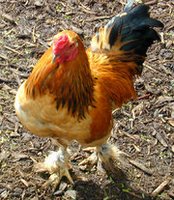 Dwarf anything and it becomes cuter--humans being the exception. Evidence: the miniature doberman, the pygmy hippopotamus, the Balearic Islands cave goat, the terribly adorable dwarf bunny, the pygmy elephant of Indonesia and their cousins, the pygmy mammoths of California.
Dwarf anything and it becomes cuter--humans being the exception. Evidence: the miniature doberman, the pygmy hippopotamus, the Balearic Islands cave goat, the terribly adorable dwarf bunny, the pygmy elephant of Indonesia and their cousins, the pygmy mammoths of California.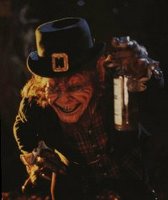 This is true for birds, too. A bantam is simply a miniature fowl, most commonly a chicken. Like their human counterparts, bantams have disproportionately large heads and large wings (UPDATE: I'm told human dwarfs do not in fact have disproportionately large wings). Bantam can also be used to mean a small but aggressive person; thus, one could describe Mahmoud Ahmadinejad as a bantam, or an angry leprechaun can be bantam (bantam can alternately be used as a noun or adjective). The word is believed to have come to us from the former city of Bantam in the north-west of Java where it is thought these pint-sized poultries first propagated. However, the OED suggests that there is some disagreement regarding this point and it is possible the word is of Japanese (speaking of bantams...) origin.
This is true for birds, too. A bantam is simply a miniature fowl, most commonly a chicken. Like their human counterparts, bantams have disproportionately large heads and large wings (UPDATE: I'm told human dwarfs do not in fact have disproportionately large wings). Bantam can also be used to mean a small but aggressive person; thus, one could describe Mahmoud Ahmadinejad as a bantam, or an angry leprechaun can be bantam (bantam can alternately be used as a noun or adjective). The word is believed to have come to us from the former city of Bantam in the north-west of Java where it is thought these pint-sized poultries first propagated. However, the OED suggests that there is some disagreement regarding this point and it is possible the word is of Japanese (speaking of bantams...) origin.bantam [OED]
Labels: Japanese, Javanese, The Daily Hump
Monday, September 11, 2006
The Daily Hump: Growler
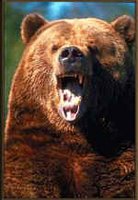 Bierkraft is an amazing little store near my house with an enormous selection of beers and cheeses from all over the world. One of the great things about the place is that you can purchase half-gallon jugs, aka growlers, of whatever beer the store has on tap. Growlers can be found at breweries and high-end beer shops around the country. The obvious question--why are these jugs called growlers?
Bierkraft is an amazing little store near my house with an enormous selection of beers and cheeses from all over the world. One of the great things about the place is that you can purchase half-gallon jugs, aka growlers, of whatever beer the store has on tap. Growlers can be found at breweries and high-end beer shops around the country. The obvious question--why are these jugs called growlers?Modern Drunkard Magazine Online (MDMO) has one hypothesis:
In pre-Prohibition times it was common for fathers to dispatch their progeny to the saloon with a growler to collect beer, and it was probably named for the growling sound a metal bucket full of beer makes when pushed across a bar top. The once popular term rushing the growler meant a hurried beer run—beer in a bucket tends to lose its head rather quickly and dad probably preferred it didn’t.Per the OED, the earliest written reference to growler (in the above sense) was in an 1888 New York Herald article:
The employment by hands in a number of factories of boys and girls, under ten and thirteen years, to fetch beer for them, or in other words to rush the growler.Although the OED corroborates the MDMO genesis of rush the growler, it does not add any additional insight into the etymology of growler itself. Thus, I rule MDMO's onomatopoeiac explanation of growler's etymology wins by default.
growler [OED]
Labels: The Daily Hump
Friday, September 08, 2006
The WordHumper Hamper
* Exceptions rule! [Steve Sailer]
* Pablum or Palaver [How to Speak 19th Century]
The Daily Hump: Hobnob
 It wasn't until Shakespeare came along that we see the first compounded use of hob and nob meaning something beyond the literal "to have and have not." In Twelfth Night Viola states "His incensement..is so implacable, that satisfaction can be none, but by pangs of death and sepulcher: Hob, nob, is his word: giu't or take't." Pleasantly for the modern etymologist Shakespeare contextually defines the 1601 meaning of "hob, nob" as "to give or take."
It wasn't until Shakespeare came along that we see the first compounded use of hob and nob meaning something beyond the literal "to have and have not." In Twelfth Night Viola states "His incensement..is so implacable, that satisfaction can be none, but by pangs of death and sepulcher: Hob, nob, is his word: giu't or take't." Pleasantly for the modern etymologist Shakespeare contextually defines the 1601 meaning of "hob, nob" as "to give or take." Around the middle of the 18th century the verb hobnob begins popping up rather frequently to mean "to drink together." In a literal sense, it still retained the meaning of giving and taking; specifically what was being given and taken was the wine of two drinkers as their glasses clinked together during a toast. We all know that drinking breeds chumminess and today the word simply means "to associate familiarly."
Of course, that's not the whole story. Back in Shakespeare's time, before the give and take aspect of hobnob was associated with wine, an adverbial definition appeared--hit or miss. Hit or miss shares an obvious linguistic symmetry with give and take and have and have not. This meaning endured well into the 20th century, although today this definition has been rendered virtually obsolete by hobnob's more popular verb form.
Hobnob [OED]
Labels: Middle English, Shakespeare, The Daily Hump
Thursday, September 07, 2006
The Daily Hump: Teeter-Totter
 In yesterday's hump I referenced the East Anglian word murgeon, meaning manure. East Anglia is the focus of today's hump, too, inspired by a piece in this week's Economist entitled "Dew you go down to Norfolk." The short piece reports on the recent push by local officials to reinforce the Norfolk dialect in elementary schools around the region. To give you an idea of what we're dealing with bishy-barney-bee translates as ladybird (Bishy-Barney-Bee Johnson?). And a tittermatorter is a seesaw.
In yesterday's hump I referenced the East Anglian word murgeon, meaning manure. East Anglia is the focus of today's hump, too, inspired by a piece in this week's Economist entitled "Dew you go down to Norfolk." The short piece reports on the recent push by local officials to reinforce the Norfolk dialect in elementary schools around the region. To give you an idea of what we're dealing with bishy-barney-bee translates as ladybird (Bishy-Barney-Bee Johnson?). And a tittermatorter is a seesaw.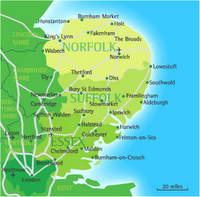 In the article, the Norfolkian linguist Peter Trudgill states that the American teeter-totter is a direct decendant of tittermatorter. I wasn't willing to take this statement at face value and decided to investigate. In English (American or otherwise) both teeter and totter have etymologies that are independent of East Anglian dialect. Teeter is a variation of titter (which the OED somewhat unhelpfully defines as "totter"). Titter has a Teutonic etymology while totter first appears around 1200 and is believed to have Norse roots. While it's possible that the Anglos who settled the Norfolk area brought with them the Teutonic/Norse hybrid tittermatorter, which then morphed into the American teeter-totter, it seems more likely that teeter-totter developed independent of tittermatorter from common etymological roots. Afterall, both teeter-totter and tittermatorter are prime examples of a very common linguistic process called reduplication, where a word or syllable is doubled, often with a different vowel. As the American Heritage Dictionary notes, "reduplication is typical of words that indicate repeated activity, such as riding up and down on a seesaw." There is nothing in the etymological history of either teeter or totter that suggests an East Anglian influence.
In the article, the Norfolkian linguist Peter Trudgill states that the American teeter-totter is a direct decendant of tittermatorter. I wasn't willing to take this statement at face value and decided to investigate. In English (American or otherwise) both teeter and totter have etymologies that are independent of East Anglian dialect. Teeter is a variation of titter (which the OED somewhat unhelpfully defines as "totter"). Titter has a Teutonic etymology while totter first appears around 1200 and is believed to have Norse roots. While it's possible that the Anglos who settled the Norfolk area brought with them the Teutonic/Norse hybrid tittermatorter, which then morphed into the American teeter-totter, it seems more likely that teeter-totter developed independent of tittermatorter from common etymological roots. Afterall, both teeter-totter and tittermatorter are prime examples of a very common linguistic process called reduplication, where a word or syllable is doubled, often with a different vowel. As the American Heritage Dictionary notes, "reduplication is typical of words that indicate repeated activity, such as riding up and down on a seesaw." There is nothing in the etymological history of either teeter or totter that suggests an East Anglian influence.(For more on reduplication, see my Macaca post.)
Teeter [OED]
Totter [OED]
Titter [OED]
Titter-Totter [OED]
Teeter-Totter [OED]
Labels: East Anglian, The Daily Hump
Wednesday, September 06, 2006
Penultimate Frisbee
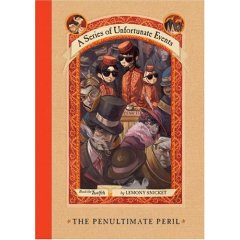 It has come to my attention that our friend penultimate is being subjected to a lot of abuse. What kind of abuse? Inaccurate humpage!
It has come to my attention that our friend penultimate is being subjected to a lot of abuse. What kind of abuse? Inaccurate humpage! Penultimate is being used to mean "quintessential” or "archetypical" when really it means "next to last." Example: It will be the penultimate vacation. Many people also mistakenly use “penultimate” when they mean "the very last."*
I personally blame Lemony Snicket and his children's book, The Penultimate Peril. This title makes one believe that penultimate is the ultimate, utmost peril, rather than the next to last peril. Doesn't it, humpers? Isn't it misleading? That Lemony is one subversive fellow. And to think he is shaping young minds.
I hope this is not my penultimate post.
P.S. If you really want to stump someone and look all smartsy, use the word antepenultimate, which means “third from the end.”
*Common Errors in English Usage, Paul Brians
Labels: Guest Hump
The Daily Hump: Curmudgeon
 Most, if not all, WordHumper readers know the definition of curmudgeon. It's used fairly often in everyday conversation to mean an ill-tempered miser, a niggard. I first came across the word in 1992 as it was the title of a track on the b-side of Nirvana's Lithium single. I remember thinking it was a strange word then, but the etymology is what truly makes curmudgeon peculiar.
Most, if not all, WordHumper readers know the definition of curmudgeon. It's used fairly often in everyday conversation to mean an ill-tempered miser, a niggard. I first came across the word in 1992 as it was the title of a track on the b-side of Nirvana's Lithium single. I remember thinking it was a strange word then, but the etymology is what truly makes curmudgeon peculiar.I really cannot explain the theory of curmudgeon's etymology better than the OED, so I'll just quote them on this one.
The occurrence in Holland's Livy, 1600, of CORNMUDGIN (q.v.) has led to a suggestion that this was the original form, with the meaning ‘concealer or hoarder of corn’, mudgin being associated with ME. much-en, mich-en to pilfer, steal, or muchier, Norman form of OF. mucier, musser to conceal, hide away. But examination of the evidence shows that curmudgeon was in use a quarter of a century before Holland's date, and that cornmudgin is apparently merely a nonce-word of Holland's, a play upon corn and curmudgeon. The suggestion that the first syllable is cur, the dog, is perhaps worthy of note; but that of Dr. Johnson's ‘unknown correspondent’, c{oe}ur méchant for F. méchant c{oe}ur, ‘evil or malicious heart’, is noticeable only as an ingenious specimen of pre-scientific ‘etymology’, and as having been retailed by Ash in the form, ‘from the French c{oe}ur unknown, and mechant a correspondent’!Personally, I always assumed the etymology had something to do with the Latin cur meaning 'why'. And there's an East Anglian word murgeon that originally had the meaning of dirt (but now tends to mean manure). I have no idea how curmudgeon would come to mean miser from 'why dirt', but I'm sure we'll come across stranger less obvious etymologies as we continue our wordhump odyssey. Anyway, we should probably just ignore my theory. On a sidenote, I think the idea of a cornmudgin is hilarious and I intend on adopting that word into my everyday vocabulary.
curmudgeon [OED]
cornmudgin [OED]
murgeon [OED]
Labels: Anglo-Norman, East Anglian, French, Middle English, Old French, The Daily Hump
Tuesday, September 05, 2006
The Daily Hump: Pablum
Per the OED, pablum refers to "insipid or undemanding intellectual fare." The etymology of the word is rather hazy. Both the OED and Wikipedia mention a wheat-based children's cereal, Pablum, invented in 1930, that was known for being soft and easily digestible. Wikipedia states that the lower-cased pablum predates the brand name. On the other hand, the OED traces pablum back to pabulum, which has as one of its defitinions "Bland intellectual fare, pap; a sample of this; an insipid or undemanding diet of words, entertainment, etc." However, the OED continues that this pejorative use of pabulum is linked to confusion with Pablum (the brand). Thus, if we are to believe the OED, there's a very circuitous etymological evolution at play: pabulum came first (sans negative definition), followed by Pablum (the brand), which resulted in the pejorative pablum, which then negatively enhanced the definition of pabulum. Get it?
Pubulum is from classical Latin pābulum food, fodder, fuel for fire, food for thought (pā-, stem of pāscere to feed + -bulum, instrumental suffix). The word pascent also comes from this root and means feeding or grazing. "The pascent creature finds a bed which at once supplies food and protection" [OED].
Also, you may be interested to know that in Canada pablum is still used as a generic name for soft baby cereal.
pablum [OED]
pabulum [OED]
Pablum [Wikipedia]
Labels: Latin, The Daily Hump
Friday, September 01, 2006
The Daily Hump: Gremlin
 Thanks to the 1984 film, society is pretty well educated on how to create an army of gremlins. First, you have to find yourself a mogwai. Dowse the mogwai with water and it'll asexually reproduce, replicating like a tribble. Then feed the resulting mogwai spawn after midnight, and voila, you have yourself a fine batch of Corey Feldman-certified Grade A gremlins.
Thanks to the 1984 film, society is pretty well educated on how to create an army of gremlins. First, you have to find yourself a mogwai. Dowse the mogwai with water and it'll asexually reproduce, replicating like a tribble. Then feed the resulting mogwai spawn after midnight, and voila, you have yourself a fine batch of Corey Feldman-certified Grade A gremlins.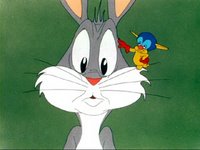 Of course, the pop cultural history of gremlins stretches much further back than the Reagan-era. Some of the more memorable gremlin moments include William Shatner's (speaking of tribbles) role as Bob Wilson in a "Nightmare at 20,000 Feet" or Bugs Bunny being harassed by his gremlin nemesis in 1943's "Falling Hare."
Of course, the pop cultural history of gremlins stretches much further back than the Reagan-era. Some of the more memorable gremlin moments include William Shatner's (speaking of tribbles) role as Bob Wilson in a "Nightmare at 20,000 Feet" or Bugs Bunny being harassed by his gremlin nemesis in 1943's "Falling Hare."The common element in both "Nightmare at 20,000 Feet" and "Falling Hare" is, of course, the plane. In fact, before Chris Columbus wrote Gremlins, gremlins were almost exclusively known for their penchant for aircraft sabotage. As Wikipedia notes
The concept of the Gremlins as responsible for sabotaging aircraft is first recorded among airmen of Britain's Royal Air Force during World War 2, in particular the men of the high altitude Photographic Reconnaissance Units (PRU) of RAF Benson, Wick and St Eval. The story attempted to explain the accidents which often occurred during their flights.
 But the etymology of the word is a bit of a mystery.
But the etymology of the word is a bit of a mystery.It's theorized that gremlin is a blend of gruaimín and goblin. In Irish, a gruaimín is a sort of mischievous imp (from Middle Irish gruaim, gloom, surliness). The word goblin was first recorded in the 16th century, although the OED notes that in the 12th century "Ordericus Vitalis mentions Gobelinus as the popular name of a spirit which haunted the neighbourhood of Évreux." The OED hypothesizes the word may have its root in a Greek word meaning "wicked spirits invoked by rogues."
However, the more intriguing theory is that the word gremlin comes from the English family name Fremlin. The Fremlins ran their own brewery whose beer was supposedly very popular among the RAF pilots and it's not much of a stretch to imagine drunk pilots blaming their planes' mechanical failures on invisible mischievous creatures.
Gremlins [Wikipedia]
goblin [OED]
gremlin [The American Heritage® Dictionary of the English Language, Fourth Edition]
The Fremlin Family Name [Fremlin.de]
Labels: Irish Gaelic, The Daily Hump